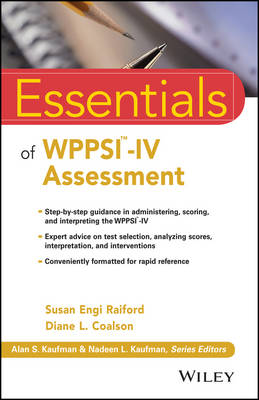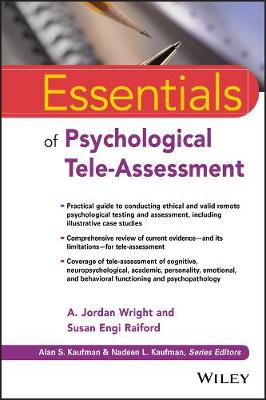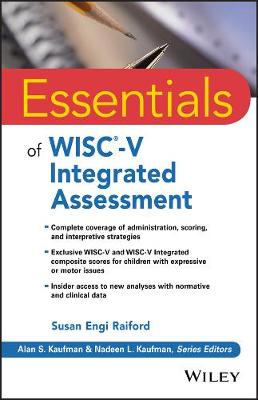Essentials of Psychological Assessment
3 total works
Essentials of WPPSI-IV Assessment
by Susan Engi Raiford and Diane L. Coalson
Essentials of WPPSI-IV Assessment applies an interpretive approach that allows flexibility in response to the real constraints and challenges inherent in working with children, describing performance in both normative and interpersonal contexts to facilitate interpretive case formulations from multiple theoretical and clinical perspectives. Topics include: * WPPSI-IV administration and clinical applications * Scoring, score analysis, and interpretation * Strengths and weaknesses of the WPPSI-IV * Differences across demographic groups The book and accompanying CD also provide alternatives for situations in which published comparison scores may not be available or applicable to a particular child, and supplies composite scores aimed at facilitating WPPSI-IV interpretation from a variety of theoretical approaches. Those who employ the WPPSI-IV must have a thorough grasp of the full potential of the tool, and Essentials of WPPSI-IV Assessment contains the insight and information that allow for deeper understanding.
Essentials of Psychological Tele-Assessment
by A. Jordan Wright and Susan Engi Raiford
Discover a comprehensive and practical guide to the use of tele-assessments in psychological testing from two leading voices in psychology.
Essentials of Psychological Tele-Assessment delivers a primer on the current state of professional knowledge related to psychological tele-assessment, ranging from the ethical and empirical considerations to the practical applications of tele-assessment procedures. The overarching framework encourages the balancing of the limitations of the current state of the research literature with the very real needs for assessment services to continue, even when in-person procedures are not feasible.
This book includes discussion on a broad range of tests and measures, with information related to both the state of the empirical support for tele-tests and measures, with information related to both the state of the empirical support for tele-assessment utilizing them and the practical 'how-to' for administering, scoring and interpreting data that emerge from them. Additionally, frameworks for integrating the data that emerge from tele-assessment procedures are discussed.
The book is applicable to those transitioning to tele-assessment practice and those training in a wide variety of training programs. Readers will also benefit from the inclusion of:
- Practical checklists and information about specific tests must be adapted to the realities of the tele-health environment.
- Information about how the results of tests should be interpreted differently to account for the tele-health environment.
- Case examples and studies to illustrate many of the challenges of working in tele-assessment
- Guidance on how to balance the limitations of the state of the empirical literature on the validity of tele-assessment with the real-world needs of clients.
Perfect for psychologists and trainees in a variety of health services, including clinical, counseling, school and forensic psychology, Essentials of Psychological Tele-Assessment will also earn a place in the libraries of anyone utilizing or training in cognitive, developmental, neuropsychological, psychoanalytic, psychodynamic, and interpersonal models of psychological assessment.
Essentials of WISC-V Integrated Assessment is the ideal companion for psychologists and other assessment professionals seeking helpful interpretive and practical information beyond the WISC-V and WISC-V Integrated published manuals. Beginning with an overview of the test and its application to educational intervention, this book provides in-depth information on new administrative, scoring, and interpretation procedures specific to the WISC-V and the WISC-V Integrated.
Insider access to the WISC-V and WISC-V Integrated standardization data allows the reader to derive new WISC-V composite scores unavailable from other resources. Readers of this book are the first to receive access to these new composite scores, which are designed to be more appropriate for children with expressive language difficulties and motor impairments. The reader also receives exclusive access to four new WISC-V expanded index scores that provide broader measures of visual spatial ability, working memory, auditory working memory, and processing speed.
Significant advances in working memory research demand more comprehensive assessment of children with a broader range of abilities and limitations. The reader will learn how to perform a highly comprehensive assessment of working memory with the WISC-V and the WISC-V Integrated.
A digital interpretive tool automatically calculates the new composite scores, completes the relevant comparisons, and generates interpretive information for new comparisons to streamline the reporting process.
The WISC-V Integrated serves to expand and clarify WISC-V results by helping practitioners better understand a child's cognitive processes and the reasons for low or discrepant performance. This book helps practitioners get more out of the WISC-V and the WISC-V Integrated, with indispensable guidance and practical tools.
- Understand the WISC-V Integrated and its proper application to the development of educational interventions
- Learn how administration, scoring, and interpretation has changed for retained subtests, how to administer and score new subtests, and how to obtain the first-ever composite scores
- Discover how to use the WISC-V and WISC-V Integrated to assess both auditory and visual working memory, and how to obtain an unparalleled and in-depth picture of working memory along a continuum of cognitive complexity
- Learn how to adjust WISC-V use for children with expressive or motor difficulties
- Explore alternative composite scoring based on the WISC-V and WISC-V Integrated standardization data to increase utility for specific populations
The WISC-V Integrated is an essential component of the WISC-V assessment process, and Essentials of WISC-V Integrated Assessment is the ideal guide for practitioners.


